
hist557 by anna m.cienciala is licensed under a Creative Commons Attribution-Noncommercial-No Derivative Works 3.0 United States License. Based on a work at web.ku.edu.
| Anna M. Cienciala (hanka@ku.edu) | History 557 Lecture Notes |
Spring 2002; Revised Nov. 2003; spring-summer 2008, fall 2009, Sept. 2010.Jan. 2011, October 2011... |
 hist557 by anna m.cienciala is licensed under a Creative Commons Attribution-Noncommercial-No Derivative Works 3.0 United States License. Based on a work at web.ku.edu. |
Poland 1957-1980/81; Czechoslovakia, 1968-80; Hungary 1957 -1980.
18A. Poland 1957-1980/81.
Introduction.
In this 24 year period, Poland experienced three workers’ revolts: December 1970, June 1976, and July-August 1980. The last revolt led to the establishment of the Free Trade Union "Solidarity," and to the Solidarity Era, August 1980-December 1981. Solidarity was crushed in mid-December 1981,when general Wojciech Jaruzelski (b.1923) imposed Martial Law. Nevertheless, underground Solidarity structures continued to exist, including media, and its ideas lived on in the hearts and minds of the Polish people. Thus, Solidarity heralded the collapse of communism in Eastern Europe and in the USSR which came in 1989-91.
I. Toward the revolt of December 1970 and its Aftermath.
The head of the United Polish Workers' Party (UPWP, Polish: PZPR), Wladyslaw Gomulka, on whom the Soviet invasion of Hungary made a deep impression,soon began to crack down on the liberalization unleashed by the "Polish October," 1956. He reimposed censorship of the press in August 1957, and took away the power of Workers’ Councils in the factories, established in Oct. 1956.
He turned against the R.C.Church in 1959 by ending the teaching
of religion in the schools, but allowed it to continue after school hours in
"Cathechism Points," generally located in churches. He also closed down schools
run by religious orders such as the Ursulines, but allowed the Catholic University
of Lublin to continue in existence.
His government routinely refused building permits for churches. In 1960, the workers of the industrial town of Nowa Huta (pron. Novah Hootah= New Steel Mill), just outside Krakow, built a wooden chapel, and clashed with the police who came to tear it down. The bishop of Krakow, Karol Wojtyla (pron. Woitylaah. 1920-2005), managed to collect funds and build a great church there. (He was elected Pope October 1978, and took the name of John Paul II, in honor of his predecessor John Paul I, whom he admired. He died in April 2005.)
In 1966, Poland celebrated the millenium of its conversion to Christianity from Rome and of its statehood, recognized at that time (966 a.d, or o.e, or o.c.e.). Church and state conducted separate celebrations, and the government refused to grant a visa to Pope Pius VI who wanted to visit the shrine at Czestochowa.
In 1966, when the Polish bishops wrote an open letter to their German brothers, proposing mutual forgiveness of sins, the government called them "traitors." It should be noted that at this time, the West German government was still refusing to recognize the Oder-Neisse Line as the western frontier of Poland.
The Intellectuals challenge the system.
Political discussions began in the "Crooked Circle Club," (named after Krzywe Kolo street where the first meetings were held in the apartment of a dissident couple), Warsaw, in 1955, and such clubs proliferated around the country. [The author of this text attended a meeting of the Club in the Old Market Square, Warsaw, in fall 1959, to hear a paper comparing the Nazi and Communist Parties. However, although the paper had been read earlier in the Writers' Club, this time the lights went out and the audience was informed that the lecturer (Jan Jozef Lipski) was sick. It was obvious that the Party leadership had intervened.]
The Polish intelligentsia began to protest against censorship. In 1964, a group of 34 intellectuals addressed an open letter of protest to the government. It was broadcast by the Polish Section of Radio Free Europe in Munich, and became widely known.
Young communist idealists began to criticize the political system. In late 1964, two graduate History students at Warsaw University, Jacek Kuron and Karol Modzelewski, drew up an "Open Letter to the Party," which they sent to the party authorities at the University. They accused the party of being a ruling bureaucracy exploiting the workers and called for a "Workers’ Revolution," in which the workers would take over the state and rule through Workers’ Councils. They also called for free trade unions, the right to organize strikes, freedom of the press, also free cultural and scientific activity -- but as Marxists, they opposed parliamentary regimes which they also considered to be repressive.* It is worth noting that the concept of the party as a managerial class alienated from the workers was first expressed in E.Europe a few years earlier by a disillusioned former close collaborator of J.B. Tito, Milovan Djilas (1905-1997).** The two students went to prison for their pains - but were allowed to continue work on their doctoral dissertations. They had visits from their academic adviser, Prof. Aleksander Gieysztor, a well known medievalist and Director of the History Institute at the University of Warsaw. (Both students became prominent dissenters from 1964 onward, and Kuron became a prominent, dissident from 1976 onward.
*[see: Gale Stokes, ed., From Stalinism to Pluralism. A Documentary History of Eastern Europe since 1945, New York, Oxford, 1996, pp.107-114.]
** [ibid., pp.101-106, excerpts from Milovan Djilas, The New Class. An Analysis of the Communist System, New York, 1957.]
Repression of Intellectuals and anti-Semitic Measures, 1967-68.
Repression was triggered by the enthusiasm expressed by Polish intellectuals in 1967 for the Israeli victory over Egypt, which was a Soviet client state at this time. Gomulka was furious although he was not an anti-Semite. In fact, his wife was Jewish, but he condemned an alleged "Zionist conspiracy." This allowed the minister of the Interior, Mieczyslaw Moczar (1913-1986, real name Nikolai Demko) to carry out an anti-Semitic purge of the party-government bureaucracy and university faculties, filling the resulting vacancies with his own supporters and thus preparing his bid for party leadership. However, he was opposed as a nationalist by the Soviet leaders, who preferred to keep Gomulka in power.
The results of the purges were shameful and tragic. Some twenty thousand assimilated Polish-Jewish writers, scholars, various kinds of specialists, journalists and bureaucrats were either forced, or chose to go into exile with their families in 1967-68.
In March 1968, there was a student revolt.
Students fleeing from militia, Krakowskie Przedmiescie street, Warsaw, March 1968 The government sent thugs dressed as workers to the University
of Warsaw. The Chancellor allowed them to come in and they beat up the students.
Students at other universities staged sit-ins and were also beaten up, except
in Wroclaw where the chancellor did not allow the thugs to enter. Friends and some workers sent
in food to the students who staged sit-ins, but most workers did not understand the reasons for the revolt, so they did not support it by coming out on strike. Many students were hurt; thousands
were expelled, and some went into exile. *
*[see Jerzy Eisler, "March 1968 in Poland," in: 1968: The World Transformed, Carole Fink et al eds, Cambridge University Press, 1998; Tom Junes, "Confronting a 'New Class' in Communist Poland.: Leftist Critique, Student Activism and the Origins of the 1968 Student Protest Movement," Critique. Journal of Socialist. Theory, v. 36, no. 2, 2008, pp. 257-272]
It should be noted that there was general discontent with living conditions in the country so the party leaders wanted to isolate the students from the rest of society. Therefore, since some prominent student leaders were the children of well known, purgedJewish Communists, they were labelled as Jews and the whole movement as Jewish. This was ridiculous because they had been brought up as Poles and had no affiliation with Jewish religion and traditions, but many uneducated people bought into this new version of anti-Semitimsm.. *
**[For an excellent analysis of the politics of the anti-Semitic campaign of 1968,see Dariusz Stola, "The Hate Campaign of March 1968: How did it Become Anti-Jewish?" in POLIN, v. 21, 1968. Forty Years After, Leszek W.Gluchowski and Antony Polonsky, eds., Oxford, Portland Or, 2009, pp. 16-36.]
"The Polish March" as it came to be called, disillusioned
the remaining communist idealists. A few months later, in late August 1968,
the Warsaw Pact invasion of Czechoslovakia ended all
hope of reforming communism from above, that is by the party leadership. Future political leaders emerged, with Jacek Kuron and Adam Michnik as the most prominent.
Still, the government gained popularity by achieving the signature of a treaty
with West Germany in November 1970, which recognized the Oder-Neisse Line as
Poland’s western frontier. Up to this time, only East Germany had signed
such a treaty with Poland in 1950, but West German governments had steadily refused to
recognize the new frontier.
[ from: Topolski, Outline History of Poland, 1986].
[Topolski: Outline History of Poland.]
The German Federal Government led by the Social Democrat Willy
Brandt (1913-1992, real name Karl Herbert Frahm), which had come to
power in late 1968, chose a policy of improving relations with the USSR
and the Soviet Bloc. It signed a treaty with the Soviet government in
August 1970, recognizing postwar frontiers in E. Europe, thus opening the way
to the Polish-West German treaty. The German Bundestag (Upper House of Legislature)
ratified the treaty in 1972, although German lawyers claimed that the final recognition
of the Polish-German frontier could only be made by a united Germany, as specified
at the Potsdam Conference in August 1945. (This was done by a united Germany
in October 1990).
The Polish Workers' Revolt of December 1970.
The backdrop to the workers’ revolt of December
1970 was economic stagnation due to Gomulka’s refusal to carry out
economic reforms on Hungarian lines (new Hungarian economic mechanism implemented in1968, see below). On Saturday, December 12, 1970, Warsaw radio announced
price increases for food and other basics amounting in some cases to 60%. At
the same time, the "thirteenth month" salary, or Christmas bonus for workers
in particularly dangerous industries such as ship building, steel mills and
coal mines, was cancelled.
The timing of this move, just before Christmas,
without any preparation of public opinion, was very bad psychology on the part
of the party leadership.
On December 15, 3,000 workers from the Lenin
Shipyard, Gdansk, along with workers from other state enterprises in the
city, marched to Party Headquarters to protest. A police officer lost his nerve
and shot one of the workers; the worker's colleagues set fire to the building,
and the staff had to be evacuated from the roof by helicopter. The workers
began sit-ins at the Gdansk and Gdynia shipyards. Nevertheless,
the local party leaders persuaded them to go back to work by promising to forward
their demands to Warsaw and to support them. Gdansk,December 15, 1970 [from Andrzej Friszke, Polska Gierka, [Gierek's Poland, Warsaw, 1995]. However, on December 16, when commuter workers began
arriving at the Paris Commune Shipyard station in nearby Gdynia,
they were attacked by riot police. Those who came after them, could not leave
the station without being shot, but more kept arriving so they spilled outside
- and were shot. Now strike committees were set up in the shipyards at Gdansk,
Gdynia and Szczecin. What is more, at Szczecin, the workers of several
enterprizes, led by those of the Warski (pron.Varskee) shipyard, formed
an interfactory strike committee. This committee made some demands, including
the establishment of a non-party Trade Union leadership. This was not, however, an idea originating with the workers.
As noted earlier, the demand for a Free Trade Union had been made in late 1964
by Kuron and Modzelewski in their "Open Letter to the Party," and it
had been broadcast by the Polish Section of Radio Free Europe.
Szczecin, December 17, 1970 [from Andrzej Friszke, Polska
Gierka, Warsaw, 1995].
II. Gierek’s Poland, Dec. 1970- August 1980.
The strikes in the coastal cities were put down by force, with
casualties estimated at some three hundred dead and wounded. In Gdansk,
workers were forced to run the gauntlet between policemen armed with sticks
and truncheons. Still, the fighting in the coastal cities continued through
December 18, and unrest spread to other parts of the country. Therefore, the
Soviet leadership "advised" the Polish leaders to remove Gomulka
and replace him with a leader who could restore order
Edward Gierek [from Pawel Machcewicz, Wladyslaw Gomulka, Warsaw, 1995].
In early January, Polish state TV showed workers of the Szczecin
shipyard joking with Gierek. This was a tape made earlier, but now used to show
worker satisfaction - which made them very angry. At about the same time, on
January 10, 1971, a Szczecin newspaper wrote that a section of the Warski Shipyard
had undertaken a special production commitment. The workers had not signed any
such commitment, so they went on strike again. They demanded that the leaders
come to talk to them - and they did on January 24, headed by Gierek. He appealed
to them for "help," and the workers agreed. He then visited the Lenin Shipyard
in Gdansk, and made the same appeal, with the same results. Finally, in late
February, after the textile workers - most of them women - struck in Lodz,
he visited there and promised to rescind the price hikes. When he did so, calm
was restored. The old prices were restored in March.
[The author of this text traveled to Poland in early January
1971 with a group of American students, most from K.U., on a student exchange
program between the University of Kansas and the Adam Mickiewicz University
of Poznan. She saw the Gierek visits to Szczecin and Gdansk on Polish TV. She
noted that many people, including high party officials, listened to the Polish section
of Radio Free Europe to learn what was going on in Poland].
Gierek also courted the intelligentsia. He did
this by granting more freedom to the media, university studies, and academic
publications. He also sanctioned the restoration of the Royal Castle in
Warsaw, which former leaders had rejected because they saw it as the symbol
of the old, anti-Soviet Poland. The restoration was very popular with
the people who collected the funds needed - money also came in from abroad -
or contributed their labor for free. The Castle was restored by the mid-1980s.
with much input from Polish scholars and artists led by the highly respected historian
of medieval Europe, Aleksander Gieysztor (1916-1998). It is a museum
of Polish history and one of the finest examples of architectural restoration
in Europe.
Gierek aimed to modernize Polish industry, so he obtained
massive credits from Western countries. This was possible due to the Brezhnev-Nixon
"detente" of the 1970s. Leonid I. Brezhnev, (1906-1982, party chief 1964-82,
head of the Soviet state 1977-82), wanted good relations with the U.S. then led by Richard
M. Nixon, (1913-1994, President 1968-1974). Brezhnev wanted peace so that the USSR could
catch up in armaments with the U.S., while Nixon wanted good relations with
the USSR to help bring an end to the Vietnam war. This situation, plus economic problems at home, allowed Poland
to secure western credits. They led to an improvement in the Polish standard
of living in the cities, which was visible in imported western cars and household
appliances. Polish economists advised decentralization, more independence
for large enterprises, cost accounting, a shift from raw materials production
(esp. coal) to developing the chemical industry, and allowing more small scale
private enterprises. These were reforms proposed by Polish economists
as far back as 1957, then by Czech economists during the Prague Spring, and
partially implemented in Hungary by Kadar, beginning in 1968.
But Gierek would not listen, so the waste and inefficiency
continued while the Polish debt to western countries piled up By the mid-1970s,
about 60% of Polish exports went to pay the interest on foreign debts. This meant that Poles could buy less at home, especially Polish food staples
such as sausage, ham and pork cutlets. At the same time, party leaders enjoyed
lavish life styles, which they no longer bothered to conceal - even though communism
claimed to aim at an egalitarian society.
The intellectuals were getting restless too. The party's announcement of impending changes in the constitution led to demands for free and freely elected trade unions; freedom of religious practice; speech, and information; self government for universities; free law courts, and free elections. The Sejm (legislature) was to be the real law giving body (instead of the Party). All these demandswere listed in the "Letter of the 59" in December 1975, which protested the new constitution that made Poland officially subjected to the USSR, while civi rights were to be dependent on loyalty to the state. The letter was a clear demonstration of dissent among Polish intellectuals, which paved the way for later open and organized dissent.
The Workers’ Uprising of June 1976 and its Consequences.
Facing a budget drain due to large state subsidies which kept
prices low, the government announced a price hike in June 1976. This time, the media claimed that the workers had been consulted and
agreed -- though in fact, only workers who were party members had done so. Radom, 25 June 1976 [from Andrzej Friszke, Polska
Gierka, Warsaw, 1995] Ursus, June 25, 1976 [ ibid]. This dissident movement was supported by the Catholic
Church, which, in December 1970, had already come
out in support of civic and human rights. At that time, Cardinal Stefan Wyszynski, Head of the Church in Poland, had demanded freedom of conscience, freedom of religious
belief, free cultural activity, the right to truth and freedom of speech. He also supported a group of intellectuals who criticized the draft of the new
Polish Constitution in December 1975 (see above) for making respect of civil rights conditional
on obedience to the state (i.e. the Party), and on affirming Poland’s alliance with (subordination to) the
USSR.) *[See: Bogdan Szajkowski, Next to God...Poland. Politics
and Religion in Contemporary Poland, New York, 1983, pp. 31-33, 40-41; in
abbreviated form: Sabrina P. Ramet, NIHIL OBSTAT. Religion, Politics and
Social Change in East Central Europe and Russia, Durham N.C.and London,
1998, p.101. See also Kemp-Welch, Poland under Communism, ch. 7-9].
The Committee for the Defense of Polish Workers - KOR
As mentioned earlier, the workers’ revolt against the price
hike of June 1976 was brutally put down - even though the government rescinded
the price increase to prevent further unrest. The brutality used to repress the
workers of the Ursus Tractor Factory near Warsaw and in the town of
Radom -- they were beaten by the police, and some died -- outraged public opinion.
A group of intellectuals organized the Komitet Obrony Robotnikow
- KOR (the Committee for the Defense of Polish Workers) in late summer-early
fall 1976. In 1978, it changed its name to Komitet Samoobrony Spolecznej,
KSS KOR (= Committee for Social Self- Defense). Two of its best known
members were Jacek Kuron [pron. Kooron] and Adam Michnik (pron.
Meekhneek) both trained historians, former communists, then dissidents. Others included the
literary critic Jan Jozef Lipski (pron. Yan Yoozef Leepskee), a dissident
since 1955, and the historian Bronislaw Gieremek,[pron. Brohneeswav Gyerehmehk]
who had resigned from the party in 1968 to protest the anti-Semitic Party policies of the time. The KOR leadership also included the well
known actress, Halina Mikolajska (pron. Haaleenah Meekowayskah).
[J.J.Lipski, A.Michnik, H.Mikolajska, 1978 [from Andrzej Friszke,
Polska Gierka, Warsaw, 1995].
KOR’s original goal was to collect financial and other help for the workers. It collected money to aid workers’ families deprived of their breadwinners
and to pay defense costs for trials, but did not stop there. It published its first underground
bulletin in September 1976, but also adopted the policy of open activism.
This meant that KOR members claimed the rights of freedom of speech, association,
and publication on the basis of existing rights in the Polish Constitution,
the Helsinki Agreements of August 1975 (which specifically safeguarded
human rights), and international labor agreements - all signed by the Polish
and other communist governments. Also, while such publications were printed underground
without government permission, the authors signed their names, daring the authorities
to come after them. KOR was the first organization to adopt this policy in
a Soviet bloc state. It provided a model for the Czech Charter 77, a dissident
group formed in Czechoslovakia in 1977.
Similar organizations representing the center or the
right, followed. The Ruch Obrony Praw Czlowieka i Obywatela - ROPCIO (Movement
for the Defense of the Rights of Man and Citizen) represented moderately reformist
and right-wing intelligentsia, while the Konfederacja Polski Niepodleglej
-KPN (Confederation for an Independent Poland) was a right wing organization.
KPN members such as Antoni Macierewicz (Aantonee Matsierevich)and Jan Olszewski (Yan Olshveskee) were
so adamantly anti-communist that they came to oppose the leaders of KOR because
some had been communists in the past. (This enmity was to continue into the
post-communist period).
An independent educational organization was established
in 1978. This was the Towarzystwo Kursow Naukowych -TKN (Association
for Scholarly Courses), made up of university professors, junior faculty, graduate
students, lawyers, writers, and artists. They organized seminars on subjects
not taught or politically distorted at the universities, such as recent Polish
history, literature, philosophy, sociology, and economics. The seminars were
held in private apartments, so they were reminiscent of the "Flying Universities"
which existed in Warsaw under Russian rule in the period 1890-1914, also the
underground education groups under the German occupation of Poland in
World War II. The difference was that now such groups were not hiding -- but were illegal since, standing on their rights, they did not seek government permission for their meetings.
The police harassed the professors, students, and apartment
owners. For the most part, the first two could be threatened with the loss
of jobs or stipends, or held under arrest for 48 hrs, while the last were fined.
Despite the harassment, the TKN flourished, and the church allowed it,
as well as other dissident organizations, to use its buildings. Also, lawyers
went out into the countryside to advise private farmers of their rights in
legal disputes with the authorities.
KOR and Mloda Polska (Young Poland, a right wing
organization) cooperated in establishing the Free Baltic Trade Union
in Gdansk, February 1978, where future worker leaders such as Lech
Walesa, Anna Walentynowicz (Valentynovich), Andrzej and Joanna Gwiazda (Gvyazdah), and Bogdan Lis (Lees),
obtained instruction and advice on organizing political activities. Another
Free Trade Union was organized in Upper Silesia. KOR also published an
illegal paper for workers: Robotnik (The Worker). It had the same
name as the socialist paper published for workers by Jozef Pilsudski
before the First World War. Anna Walentynowicz Lech Walesa KOR, ROPCIO, KPN, and Mloda Polska (Young Poland) inspired and helped organize
annual celebrations of May 3, in honor of the Polish Constitution of May
3, 1791. [ See Lec.Notes no. 4. May 3 had been a public holiday in interwar
Poland]. Indeed, Lech Walesa once drove around Gdansk handing out copies
of the 1791 Constitution as part of the local protest movement. They organized special
masses on May 3 and also November 11 - celebrated as independence day in interwar
Poland. [On Nov. 11, 1918 -- Armistice on the Western Front -- Pilsudski cleared Warsaw of German troops, who were allowed to go home.]
Sometimes demonstrations followed mass in church, and the people coming out were attacked by the police. There were also special masses on September 17, in memory of the Soviet invasion
of eastern Poland in 1939. Indeed, in September 1979, there were slogans on
the walls of some Warsaw buildings that read: "Remember September 17!" On November
11 of that year - independence day in prewar Poland - police charged a procession
of people walking from a Warsaw church to the Tomb of the Unknown Soldier nearby.
In fact, national symbols were increasingly fused with
opposition to the government, which increasingly included workers. The latter demanded
a monument in memory of the workers killed at Gdansk on December 16 1970. Walesa tried to lay a wreath on the site of workers killed there on each anniversary
after 1976, but the police usually confiscated it. On one occasion, however,
the policemen delivered the wreath to St. Bridget’s Church, whose pastor, Father
Jankowski, supported the demand for a monument.
Finally, a large illegal, independent press developed in the period
1976-80. This too had precedents in the 1890-1914 and 1939-45 periods
of Polish history. In the early days, dissident printers requested technical
advice from Home Army veterans of World War II, but they soon acquired xerox
and printing machines smuggled in from the West. They were paid for by the American Federation of Labor and Industrial Organizations - AFL-CIO - funds from the CIA,and private gifts. Checks could be sent to addresses in Europe. Cash was carried concealed in the clothes of dissidents and sympathizers going to Poland, who risked arrest if discovered. In 1979-80, about 400 different, illegal
publications were printed by illegal presses, including books published
by Miroslaw Chojecki (pron. Meeroswaf Khoyetskee) in his publishing enterprise
Nova. He even displayed them at the annual Warsaw Book Fair, where the
police did not intervene because western booksellers were present.
Polish authorities acted under some constraints when harassing
the rapidly growing dissident movement. Too much repression might lead to public
protest and unrest; it also risked antagonizing both the church and the U.S.
government -- which was shipping surplus food products to Poland in exchange
for Polish currency scholarships for U.S. students in Poland and Polish books
for U.S. libraries (Public Law 480).
Furthermore, one of President Jimmy Carter’s key policies
was support for human rights, which was a boost for Polish dissidents. He visited Poland in December 1977, the
third U.S. President to do so (after Richard Nixon, 1972, and Gerald Ford, 1975).
When Carter landed at Warsaw airport, the official U.S. translator , who was
more familiar with Russian than Polish, translated Carter’s phrase on the Polish
"love of freedom, " as "lust for freedom," to the great amusement of the Polish
public. U.S. TV coverage of the presidential visit included a clip showing an illegal seminar
being held in a Warsaw apartment.
The Election of the Polish Pope and his visit to Poland
in June 1979..
On October 16, 1978, Cardinal Karol Wojtyla (b. 1920),
Archbishop of Krakow, was elected Pope by the College of Cardinals in Rome and
took the name: John Paul II (after John Paul I, Pope for only 33 days in 1978). JP II was the first non-Italian
pope since the Dutchman Adrian VI, who was briefly Pope in 1522-23.
Poland went wild with joy. People stood in line to ring the
church bells. The government hesitated at first, but then hailed the Pope as
"a great son of Poland,"and allowed the announcement and the Pope's speech to the crowds in Rome to be shown on Polish TV. Rumor
had it that Soviet leader Leonid Brezhnev phoned Gierek and asked angrily
why he did not prevent Wojtyla's election since Wojtyla was a Polish citizen!
Moscow must have been even more worried on hearing of the Pope’s plan to visit Poland
in 1979.
Indeed, John Paul’s visit to Poland in June 1979 had a
tremendous impact on the country. He was seen and heard by millions
of people -- though Polish TV carefully omitted showing the crowds which could
be seen on western TV. Some 200,000 people attended his open air mass in Warsaw
and about 1,000,000 came to hear him on the fields below the Polish national shrine, the monastery of Jasna
Gora (pron. Yasnah Goorah) at Czestochowa [pron. Chenstokhovah]. Over
a million heard him in Krakow. John Paul II spoke about the people’s right to "have God in their
lives," and the "right to freedom." Order was kept everywhere by Catholic laymen
and the police were hardly visible. People realized that strength lay
in numbers and this broke the barrier of fear. Thus, the Pope’s
visit in June 1979 was an important prelude to the birth of Solidarity
in August 1980.
[Papal Mass, Warsaw, June 2, 1979 [from Andrzej Friszke, Polska
Gierka, Warsaw, 1995].
As Adam Michnik wrote twenty-four years later: "For
the people of Poland, John Paul II, by making human rights the central subject
of his teaching, will for ever be the man who gave us courage and hope, who
restored our historical identity. (The Independent, London, Nov. 17,
2003) The Economic Crisis.
In 1979, the decline in Poland’s standard of living, as compared
with 1973, was visible to the naked eye. [The author of this text spent the
academic year 1979-80 doing research in Warsaw.] The country was the fifth largest
coal producer in the world, yet power cuts idled factories and mines
for several hours each day and cities other than Warsaw suffered domestic power
cuts. According to a relative of this author, who was then a power plant engineer, this situation was due to the fact
that the government had not built enough large power plants to keep up with
industrial growth, especially after Gierek built a huge new steel mill in
his home town, Katowice, the capital of Upper Silesia. Furthermore, the
government had contracted to export electric power for hard currency payments
to Austria, and for rubles to Soviet bloc countries.
The Polish transport system was also breaking down. At
any given time, about 50% of the railway cars, buses, and trucks were in repair,
which took a long time because of endemic shortages of spare parts. Furthermore,
roads and railway tracks were in a bad state due to years of under-investment.
Food production was down in 1979 not only because of
a series of bad harvests, but also because the government discriminated against
private farmers who owned about 78% of the land. They suffered from state
purchase prices set too low to cover their costs. Furthermore, the inefficient state
and collective farms obtained fertilizers, cattle feed and machines below cost
while private farmers, who produced three times as much per acre, could only
buy them on the black market with U.S. dollars! [A private farmer complained of this to the author of these notes in 1980.] Private farmers refrained from specializing in cattle raising
or crops because, if successful, they would lose all their profits to increased
taxes --intended to prevent any private wealth. [Same source as above.] There was also a great housing shortage despite Gierek’s
policy of constructing prefabricated, concrete bloc apartment buildings.
The shortage was due to the Polish "baby boomers" starting their own families. Young
married couples waited an average 10-15 years for their own apartment in a housing
cooperative,meanwhile often living with parents. Deposits were very high, but demand grew every year.
Finally, the health service had deteriorated to the point
of disaster. Hospitals were overcrowded; doctors and nurses were woefully
underpaid, so they accepted "presents" from their patients. An operation by
a well known surgeon usually required a sizable gift in cash. People were dying
for lack of foreign medications, which the government had ceased importing to
save foreign currency - - but did buy for government clinics used by higher
party functionaries, also loyal academicians, artists and scientists. Ordinary
people had to lie in crowded hospital rooms and even in corridors, while the
elite enjoyed private rooms, good food, and a high standard of medical
care. [The author of these notes visited friends in both types of hospital in 1972-73 and later.]
Indeed, high party and government officials, industrial managers,
high military and police officials, enjoyed excellent housing, luxury vacation
resorts, and superior medical care. What is more, luxury was visible in high
party circles. People talked of Gierek’s luxury villa just outside Warsaw,
and his old friend, Maciej Szczepanski, the head of radio and TV, was
known for his expensive parties and African safaris. Premier Piotr Jaroszewicz's
son, who was the head of the government auto import enterprise, was
known to gamble in western casinos.
In January-February 1980, the leadership decided to allow a fairly open
TV coverage of people’s opinions in the period preceding and during the elections
to the Eighth Party Congress, which were held on February 11-15. TV viewers
were surprised to see workers complaining about managers who stole building
materials from factories and used factory labor to build their town villas and country
houses. In Lublin, an automobile factory manager complained that East German
computers used in car production were imported without instruction manuals --
so he had to learn how to use them by trial and error, thus causing production
delays and cost overruns. [The author of this text, then in Warsaw, saw the interview on TV.]
As it turned out, this kind of criticism was used by Gierek
to pave the way to dismiss premier Jaroszewicz (Yaaroshevitch), who was made the scapegoat
for economic problems. He was succeeded by Gierek’s old friend Edward Babiuch
(pron. Baabyukh), who was known for his modest life style. Unrest was growing in May-June 1980. People talked
about expected worker unrest when they stood in line to buy food. They
said that when the workers rose up again, they would not go out into the streets
and get shot, as in December 1970, but would stage sit-in strikes in the factories,
shipyards, and coal mines. [The author of this text heard such statements when
standing in line to buy meat.]*
[For Poland 1945-1980, see A. Kemp-Welch, Poland under Communism. A Cold War History, Cambridge, England, 2008, ch.1-9. For the period 1976-80, see also Michael H. Bernhard, The Origins of Democratization and Oppositional Politics, 1976-1980, New York, 1993.]
III SOLIDARITY.
1. The Birth of Solidarity.
On July 1, 1980, Premier Babiuch announced new price hikes
for meat and other basic products.
As in the past, the government budget was overburdened by food subsidies and payment of interest on foreign debt, hence the decision to raise prices. The price hike announcement was followed by strikes all
over Poland. They were uncoordinated, so government officials settled
one after another by agreeing to wage increases. However, in late July, there
was a city-wide strike in Lublin, where all the factories went on strike.
Also, Lublin railwaymen stopped trains carrying Polish consumer goods to the
USSR, and distributed them to the local people. As the author of this text noticed-- then being in London -- these events did not attract much attention in
England, where many people were glued to their TV sets watching the tennis
championships at Wimbledon, London. (McEnroe lost to Swede Bjorn Borg and
was very rude to the umpires..)
In mid-August, there was a strike at the Lenin Shipyard,
Gdansk, some of whose workers had been killed in the
December 1970 uprising. Two factors precipitated the strike here: (1) the dismissal
of a popular crane operator, Anna Walentynowicz),
known to be a member of the Free Baltic Trade Union; and (2) the price hikes,
which led the workers to demand pay raises. In the meanwhile, however, Lech Walesa, arrived
on the scene. He worked as an electrician, was well known at the shipyard and, as mentioned earlier, had been one
of the strike leaders in December 1970. He had been fired and had worked elsewhere.
Like Anna Walentynowicz, he was a member of the Free Baltic Trade Union.
Now, he tried to persuade the workers not go back to work, but failed. However,
as they began to leave the shipyard to go home, they were stopped at the
gates by two women: Anna Walentynowicz the crane driver, and Alina
Pienkowska, a nurse. They persuaded some workers to go back to the
shipyard. A third woman, Henryka Krzywonos [pron. Kzhyvohnos] a streetcar
driver, was also a strike leader. Moreover, delegates from other Gdansk striking
factories and enterprises began to arrive.They appealed to the workers
not go give up, but coordinate their activities with them. Walesa
put this proposal to about 400 workers (out of 10,000) who were still standing
around. They agreed, and began a sit-in strike; they were joined by some others, who returned,
for a total of about 1,000.
On the evening of August 16, an Interfactory Strike Committee
was formed (Polish acronym: MKS). The MKS gathered in more and more enterprises,
not only from other Baltic port cities, but also from other parts of the country,
especially Silesia. The leaders then set up the Provisional Coordinating
Commission (Polish acronym: TKK), to coordinate action all over the
country.
A few days later, some intellectuals, mainly from KOR, arrived
from Warsaw to offer their help. They joined some Gdansk intellectuals to form
a group of advisers led by Tadeusz Mazowiecki (pron. Tahdewoosh
Mazohvyetskee, b. 1927, a Catholic journalist, who was to become the first non-communist
premier of Poland in September 1989).
The government reacted to these developments by cutting all
telephone, rail, road and air communications between Gdansk and the rest of
the country - then proposed negotiations. The strikers said: no dice, unless
communications are restored. A Deputy Premier, Tadeusz Pyka, arrived
in the city, but made no headway. He was then replaced by Mieczyslaw Jagielski,
who had settled the strikes in Lublin.
The plenary meetings between the government delegation and
the MKS leaders were broadcast over the shipyard loudspeakers. They were
recorded on cassettes, which were then carried to other striking enterprises,
creating the "cassette revolution." Some of the plenary sessions were
televised by foreign reporters and can be seen in the film: Robotnicy 1980
(Workers 1980). Its scenes were recreated in Andrzej Wajda’s (pron. Aandzhey
Vaydaa) film: The Main of Iron, (a follow up on his earlier film: The
Man of Marble, showing worker exploitation in the period 1945-56). However,
the substantive negotiations were carried on by the government advisers and
the workers’ advisers. Most of them were acquainted, which helped in their talks.
Some historians deny the input of Polish intellectuals into
the birth of Solidarity, claiming that it followed the example set by the Szczecin
workers in December 1970- January 1971. However, it should be noted that the
Gdansk leaders were members of the Free Baltic Trade Union set up by
KOR, and that some 200 activists had been members of self-education circles
organized by KOR and members of "Young Poland." *[For works denying or belittling the role of intellectuals
in the birth of Solidarity, see: Roman Laba, The Roots of Solidarity. A Political
Sociology of Poland’s Working-Class Democratiziation, Princeton, N.J., 1991;
Lawrence Goodwin, Breaking the Barrier. The Rise of Solidarity in Poland,
New York Oxford, 1993. For the history of KOR and its role in 1980-81, see Jan
Jozef Lipski, KOR. Workers’ Defense Committee in Poland, 1976-1981, Berkeley,
CA., 1985. For an eyewitness account by an English journalist and historian,
a specialist on East Central Europe, see Timothy Garton Ash, The Polish Revolution.
Solidarity, New York, 1983, revised edition, 1991, including a Postcript., also A. Kemp-Welch, another English eyewitness, Poland under Communism. A Cold War History Cambridge, England, 2008, ch. 10. Gdansk. See also Jadwiga Staniszkis (pron. Yadveegah Staaneeshkees), Poland’s Self-Limiting
Revolution, edited by Jan Gross, Princeton, N.J.,1984, ch. I, Origins of
Solidarity. (The author, a Sociologist, was a Solidarity adviser in the negotiations).]
The strike ended with the signing of the Gdansk Agreement,
also known as the 21 Points, on August 31 (A similar
agreement was signed in Szczecin on August 30). Its key points were:
(a) establishing a Free Trade Union and safeguarding the right
to strike; There were compromises:
Solidarity agreed to recognize "the
leading role of the PZPR (English: PUWP = Polish United Workers’ Party) in the state, also the
existing system of international alliances (Warsaw Pact). Solidarity wanted
to abolish censorship, but then demanded a law defining it. The 21 Points was,
indeed, an impressive document. *
Signing the Gdansk Agreement, August 31,1980
[from Andrzej Friszke, Polska Gierka, Warsaw. 1995].
*[For the full text of the 21 Points and the final version signed,
see: Lyman H. Legters, ed., Eastern Europe. Transformation and Revolution,
1945-1991, Lexington, Mass., Toronto, 1992, pp. 253- 262; also From Solidarity to Martial Law. The Polish Crisis of 1980-1981. A Documentary History, edited by Andrzej Paczkowski and Malcolm Byrne, Budapest, New York, 2007, doc.7 the book is also available on the Internet.]
It was not clear at the time whether, or for how long, the Polish
government intended to honor the agreement -- but it was soon clear that it would
try to delay its implementation. Thus, the Polish Supreme Court delayed the
ratification of Solidarity until November 1980, while Rural Solidarity
[private peasant landowners] had to wait for recognition until April 1981.
The Symbols of Solidarity.
The symbols used by Solidarity to get its message to the Polish people were recognizable to all: (a) Religious: the Cross, the image of Our Lady of Czestochowa (worn by Walesa in his lapel), and especially, the image of Pope John Paul II; (b) National Colors: the Polish national colors of white over red. The Solidarity Logo, the work of a young Gdansk designer, Jerzy Januszewski, had the letter N (for Narod = the nation, people) carry the Polish flag (see in Google);(c) Literary: the reading of romantic, 19th c. Polish poems, especially the anti-Russian verses from the poetry of Poland's greatest romantic poet: Adam Mickiewicz (1798-1855).The shipyard workers of Gdansk also wrote their own poems and read them in public. (d) Non-Violence: flowers.*
*[For a table of the principles, their symbols, and the institutions using them, see Table 5, Jan Kubik, The Power of Symbols Against the Symbols of Power. The Rise of Solidarity and the Fall of State Socialism in Poland (University Park, PA 1994), p, 180. This is the authoritative work on the subject.
Solidarity also used ceremonies: celebrating the Polish national holidays, which had been dropped by the communists: May 3, in honor of the Constitution of 1791, and November 11, in honor of the anti-Russian uprising of 1830, but, especially the unveiling in Dec. 1980 of the monument to the Lenin Shipyard workers killed in Dec. 1970.
Designed by an engineer from the shipyard's design division, Bogdan Pietruszka, the three, tall pillars of the monument symbolized the first three shipyard workers killed in Dec. 1970; the three crucified anchors stood for the workers' revolts of 1956, 1970, and 1976, as well as forthe professions of people who lived off the sea: shipyard and dock workers, and sailors. The anchor's religious symbolism was hope.
[See in Google: Solidarity Monument, Poland.]
The organzing committee asked the poet Czeslaw Milosz to write an epitaph, but he refused. He advised them to use Psalm 29.11, in his translation::
The Lord will give strength unto his people,
the lord will bless his people with peace.
This was accepted, but the committee decided also to add verses from his 1950 poem:
You who have wronged a simple man
Bursting into laughter at the crime
....................................................
Do not feel safe. The poet remembers
You can slay one, but another is born
The words are written down, the deed, the date. *
*[This account, with quotations, is taken from: Jan Kubik, ch. 6; for inscriptions on the Gdansk monument, see p.198. Milosz, who won the Nobel Prize for Literature in 1980, visited Poland in spring 1981 for the first time since he chose freedom in the West 30 years earlier. He then came to see the monument in Gdansk. He returned to Poland for good after the fall of communism. He lived in Krakow, where he died in August 2004. ]
(For the latercontroversy over Walesa -- whether he was, or was not a Security Police agent in 1970-76 or even later-- see Appendix at the end of these Lecture Notes.)
The Solidarity Period, Aug. 31, 1980 - December 13, 1981.
For the first few months, the country was in a state of euphoria.
There was free speech and free elections of leaders in all kinds of civil and
institutional organizations, including university chancellors by the faculty (as had been the
custom in interwar Poland).
As described above, a monument was built in memory of the Gdansk workers killed
on December 16, 1970.
A group of university professors helped draw up a list
of Solidarity goals for the nation. After approval by the Solidarity
leadership, they were published in the Solidarity weekly, Tygodnik Solidarnosc,
on April 17, 1981. They foreshadowed the Solidarity Program announced
at the Solidarity congress in summer 1981 and approved in October of that year
(see below).
On May 13 1981, there was an attempt to assassinate Pope
John Paul II in Rome, who was shot and seriously wounded. One of the assassins,
a Turk named Ali Agca, was apprehended, but acted at his trial as if
he were deranged. He was condemned to life imprisonment (later reduced to 20
years). An Italian prosecutor tried to prove a Bulgarian connection, but there
was not enough proof. However, in 1998 the other assassin, living in Turkey,
stated in a newspaper interview that he had been aided to escape by Bulgarians.
It seems likely that the Bulgarian Security Police worked with the Soviet KGB
to use Agca and others to assassinate the Pope, but Soviet and Russian governments
have denied this, as has the Bulgarian government. [Agca ended his 20 year sentence
in 2000, but was handed over Turkish authorities who put him in prison on earlier
charges, pending trial]. In 2008, a document was found in the Russian archives showing that the Politburo of the Soviet Communist Party had approved the taking of "special measures" against the Pope in 1981. One of the signatories was Mikhail S. Gorbachev, who was to be a reformer and the last leader of the USSR. * We do not know whether these "special measures" included assassination, but it seems likely they did.
*[David Dastich report from Warsaw, April 27, 2008, on book by John Kohler to come out in Warsaw next day, see Canada Free Press. The report has a picture of Gorbachev and his wife Raisa being received by the Pope.}
On May 28 1981, Cardinal Wyszynski died of cancer. One
may assume that if the Pope had been killed, the disappearance of these two
church leaders, both strong supporters of Solidarity, would have had a demoralizing
effect on the movement.
Pope John Paul II and Cardinal Stefan Wyszynski, 1979
[from Andrzej Friszke, Polska Gierka, Warsaw, 1995].
In 1980-81, changes took place in the Polish party-government
leadership. On advice from Moscow, Gierek resigned for "health reasons"
in September 1980, and was succeeded by a veteran bureaucrat Stanislaw Kania
(pron. Stahneeslaaf Kanyah, b. 1927). The PUWP held an Extraordinary Party Congress in July 1981,
to which delegates were elected by secret ballot, and the Congress elected
the Central Committee in the same way. However, the Congress did not enact any
political or economic reforms, which led to great public disappointment. This was not surprising, however, given the Soviet leadership of the time; it was pressing the Polish leaders to crush Solidarity.
Stanislaw Kania [from Andrzej Friszke, Polska Gierka,
Warsaw, 1995].
Indeed, storm clouds were gathering over Poland. In December
1980, Warsaw Pact military formations stood on Poland’s eastern --USSR --and western frontiers -- the communist German Democratic Republic -- and in the S.W., the Czechoslovak Dem. Republic. Also, Soviet warships off the Polish coast.
A Warsaw Pact Command Staff exercise began along the Polish borders on December 8,
1980. Czech documents show that some Czech and East German troops movements into Poland were scheduled to take place in early December.The Czech movement, called "Operation Karkonose" (pron. Karkohnoshe, a mountain
range in the Sudeten mountains), began on the night of December 6-7,
but was countermanded on December 9. The documents for this operation were destroyed,
so that only full access to appropriate Russian documents of the time
could clarify exactly what was intended and then cancelled. It is known, however,
that a few Czech and East German divisions stood by on their frontiers with Poland until July 1982.
A Polish colonel, Ryszard Kuklinski, who worked on the Polish General Staff, had decided to report to the CIA after learning of the Warsaw Pact "counter-attack" plan against NATO, drawn up in 1964. It envisaged a Warsaw Pact "defensive attack" against NATO, and assumed NATO tactical nuclear weapons attacks on Soviet troops and supplies traveling West through Poland. He reported on the Dec. 1980 Warsaw Pact concentrations to the CIA. It is known that President Jimmy Carter phoned Soviet leader Brezhnev on Dec. 3, warning him that East-West relations "would be most adversely affected " if the Soviet Army tried to impose a solution on the Polish nation. Kulinski's report arrived one and half days later. It is not clear what made Brezhnev decide against intervention, but the decision seems to have been made before Dec. 4
At this time, U.S. intelligence had no access to Soviet military codes because a former English spy and intelligence worker had sold them the information that the CIA could read them; the Soviet authorities then changed the codes. This made western governments all the more nervous about a possible Soviet military intervention in Poland.*
*[On Kuklinski, see Benjamin Weiser, A Secret Life; The Polish Officer, His Covert Mission, and the Price He Paid to Save His Country, New York, 2004. On the Warsaw Pact Plan of 1964, see John Radzilowski, "The Origins of Terror," FrontPageMagazine.com Jan.25,2006; also General William E. Odom,"Comment on the 1964 Warsaw Pact Plan," www.freerepublic.com/focus/f-news/1154719/post. (Gen. Odom died in June 2008, aged 75.) On the Carter phone call to Brezhnev and Kuklinski reports 1980, see the Mark Kramer article, "New Evidence on the Polish Crisis 1980-1981," Cold War International History Bulletin 11, esp. "Report no.1, Early December 1980, Warning of Soviet Intervention," p. 50, and note 22, citing Brzezinski's diary and his memoirs. According to John Davis, U.S. ambassador in Warsaw at this time, the Kuklinski report -- which did not give a date for Martial Law, then as yet undecided --was not sent on to President Reagan or any appropriate govt. official, see John Davis, "Postwar Relations: The Long Climb from Yalta and Potsdam to Gdansk and the Rountable,"The Polish Review, vol. LIV,2009, no. 2, p. 207. (John Davis was then Director of the Office of East European Affairs, State Dept). On the English spy, Geoffrey Prime's selling the information on U.S. and British reading Soviet military codes, which led to their being changed, see Matthew Aid, The Secret Sentry, reviewed in The Times Online, May 24, 2009.]
It is believed that the Pope also warned Moscow. If so, he probably did this in his meeting with the Soviet Ambassador in Italy.
Toward Martial Law.
By early 1981, Polish people were growing weary of
food shortages and rising prices. As the economic situation grew worse, frustration and unrest increased. The country was in a deep economic crisis
and ration cards were introduced. Solidarity advisers such as KOR member Jacek Kuron kept hoping for the development of "a democratic, pluralistic society... on the
level of corporations, cooperatives, consumer associations," etc. He thought
such a system could be established from below, while principal decisions would
be coordinated with the central authorities of the PUWP, which would
control the police, the military, and foreign policy. Above all, Kuron stressed
that the communist government must not fall, for this would precipitate [Soviet] military
intervention. *
*["Not to Lure the Wolf out of the Woods," an Interview with
Jacek Kuron, conducted by the German magazine, Der Spiegel (The
Mirror, December 1980), cit. Legters, Eastern Europe, 1945-1991, pp.262-268].
Solidarity Congress, Gdansk, September-October 1981
[from Andrzej Friszke, PolsInka Gierka, Warsaw. 1995].
In September - October 1981, Solidarity held a congress in
Gdansk in two parts: September 5-11, and September 26 - October 7. Walesa was narrowly re-elected chairman, because he was heavily criticized for
single-handedly negotiating away the general strike in March, and in general
for being "authoritarian."
Cartoon from Der Spiegel (1980) titled "The Polish Power Act"
(Walesa lifting the Russian bear.), from Andrzej Friszke, Polska Gierka, Warsaw,
Poland, 1995].
I. Who We Are and What We Want. ...What unites us is a revolt against injustice, abuses
of power and monopolization of the right to speak and act in the name of
the nation. What unites us is our protest against a state which treats the
citizens as its own property.
...Respect for the person must be the basis of action: the
state must serve the people instead of dominating them. The state organization
must be at the service of society and not be monopolized by a single political
party.
...Solidarity returns to the values of Christian ethics,
our national working-class tradition, and the democratic tradition of the
labor world....Solidarity is also a movement for the moral rebirth of the
people.
We believe that the people’s power is a principle that we
do not have the right to abandon... our objective is a self-governing Poland. II. The Union [Solidarity] and the Country’s Present Situation. ...Society looks on us as the only guarantors of the agreements
that have been signed. This is why the union considers that its main task
is to take every possible short and long-term action to save the country
from bankruptcy, and society from poverty, despondency and self-destruction.
The only way forward is to renew both state and economy through democratic,
social initiatives in every field.
...Our aim is to perform our great labor of renewal without
damaging international alliances; indeed, we seek to provide more solid
guarantees for these alliances. [This was addressed to Moscow. AMC.] ..Thesis one: we demand that, at every level of leadership,
a democratic, self-management reform should enable the new economic and
social system to combine planning, autonomy, and the market.
...A new economic structure must be built...the basic unit
will be a collectively managed social enterprise, represented by a workers’
council and led by a director who shall be appointed with the Council’s
help and subject to recall by the council. The social enterprise... shall
apply economic calculation in the affairs of management. The state may influence
enterprise activity through various regulations and economic instruments
- prices, taxes, interest rates and so on..
...It is necessary to sweep away the bureaucratic barriers
which make it impossible for the market to operate. ....Enterprises should
be able to operate freely on the internal market ..International trade must
be accessible to all enterprises...The relation between supply and demand
must determine price levels...
The reform must socialize planning so that the central plan
reflects the aspirations of society and is freely accepted by it. Public
debates are therefore indispensable...
Thesis two: the approach of winter necessitates immediate
and energetic action; the union declares that people of good will are available. ...In our view, the government should investigate the conditions
under which Poland might join the International Monetary Fund and the International
Bank for Reconstruction and Development, and present them to the public.
At the same time, we should do everything possible to maximize output by
using the country’s resources...
Thesis four: The Union recognizes the need for a restored
market equilibrium within the framework of an effective anti-crisis program
that will involve a national reform and protect the weakest of the population. ...Thesis six: Although the union will protect everyone,
it will take special care of the poorest sections.
...Thesis seven: The Food Supply is now the most important
problem; ration coupons must be honored in practice, and food should be
distributed under social control.
.... Thesis eight: The union will resist growing social
inequalities among enterprises and regions.
[Theses 9 - 18 dealt with labor protection and social service policy, AMC.]. VI. The Self-Governed Republic.
(Theses 19-32 dealt with the implementation of pluralism in all spheres of life).
Note Thesis 19, point 4, which sought to appease Polish and Soviet communists:
(Theses 33-36 dealt with the functioning of the Union, self-management on all
levels, independent law courts, and legal guarantees of civil rights).
VIII. The New Social Contract. ...We do not pretend to have a monopoly of the truth.
We are ready for an honest and loyal dialogue, an exchange of ideas with
the state power, a quest for just decisions which will better serve the
country and the interests of working people and citizens. May this accord
unite us around what is national, democratic and human in Poland, around
those things that do not divide us.* *[L.H. Legters, Eastern Europe.. 1945-1991,.pp. 268-289;
extracts from a different translation: Gale Stokes, From Stalinism to Pluralism,
1996, pp. 209-213]. As the economic situation grew worse, some people blamed
Solidarity for the shortages, or/and for not carrying out economic reforms.
Meanwhile, General W. Jaruzelski [Yaroozelskee], who was already Minister of
Defense, became Prime Minister in February 1981, and replaced Kania
as head of the Party in October.
Russian documents show that Jaruzelski and Kania were under constant
pressure from the Soviet leadership to crush Solidarity, and that they kept
on trying to win more time by arguing that the situation was not yet ripe for
action. They also described this pressure in their memoirs. Thus, it was not surprising that the hardliners ("healthy elements"), Tadeusz Grabski, Stanislaw Kociolek, Stefan Olszowski and Andrzej Zabinski
received support and encouragement from Moscow. At the Central Committee meeting
which began in Warsaw on June 10, Kania dramatized the danger of
counter-revolution and anarchy, but this was not enough for the hardliners.
They demanded a change in Politburo membership and the crushing of Solidarity
by force. On the second day, when Deputy Premier Rakowski defended government policy,
some members shouted and stamped their feet in disagreement. Perhaps it was
an attempt - directed from Moscow - by these members to take over the leadership? Whatever the case might be, it was only when several generals close to Jaruzelski spoke in support of the government, that three quarters of the Central Committee
voted confidence in the leadership. At the Politburo meeting of June 10, there
were some sharp disputes, but it was finally agreed not to accept Gierek’s resignation
from the committee. *
*[On the Soviet Central Committee letter of June 5 , 1981 to
the Polish Central Committee, see: Zbigniew Wlodek, ed., Tajne dokumenty
biura politycznego. PZPR a Solidarnosc, 1980-1981 (Secret Documents of the
Polish United Workers’ Party Politburo and Solidarnosc, 1980-1981) London, 1992,
pp. 392-396; for the discussion in the Politburo, June 10, see ibid.,
pp.401-405; Eng. trans. in Paczkowski and Byrne, The Polish Crisis of 1980-1981, doc. 51.]
Soviet Marshal Victor G. Kulikov, Commander-in-Chief of Warsaw
Pact Forces and Deputy Defense Minister of the USSR, spent the month of August
in Poland. He met with Kania and Jaruzelski, demanding that
they crush Solidarity. He also met with some Polish generals. More importantly, Soviet party leader
Brezhnev sent Kania a telegram demanding that the Polish party
leaders present him with a plan of action against the "counter-revolution" going
on in their country.
On August 14, Kania and Jaruzelski met with Brezhnev
and other members of the Soviet Politburo in the Crimea. Brezhnev repeated
his negative views of the Polish situation and insisted that force be used
to crush Solidarity.* Finally, the Polish leaders agreed to use force if
the situation required it. This was clearly judged as inadequate for on August
20, the Soviet government announced drastic reductions in oil and cotton
supplies to Poland for the following year, and reduced them further in Polish-Soviet economic
negotiations that took place during the Solidarity Congress. This was drastic
economic pressure.
*[See: Soviet Deliberations During The Polish Crisis, 1988-1981, Edited, Translated, Annotated and Introduced by Mark Kramer, CWIHP Special Working Paper No.1, April 1999, doc. no. 16.]
Furthermore,. Between September 4 and 12, the Soviets announced
a series of maneuvers titled "West - 81," which took place in Ukraine, Belarus,
the Baltic Republics, and on the Baltic Sea. This was clearly a warning to Solidarity and presssure on the Polish party leaders to impose Martial Law. Its mechanics were approved by high Polish and Soviet military officers in mid-September, but the date was left blank.
Polish-Soviet Talks, Crimea, August 14, 1981.
[from Andrzej Friszke, Polska Gierka, Warsaw, 1995].
On 11 September, the day on which the first part of the
Solidarity Congress ended -- after appealing to workers in other Soviet bloc
countries to follow their example -- Brezhnev phoned Kania
and demanded once again that martial law be implemented in Poland. He
said that if Warsaw Pact communication lines were threatened, the WP countries
would act. This was a serious threat.
In the second half of September 1981, the Polish leaders received
what amounted to a Soviet ultimatum. However, Kania and Jaruzelski managed to
stave off this threat as well as reductions in key Soviet supplies for the Polish
economy. It was not surprising that Polish appeals for economic aid to Czechoslovakia
yielded only minimum amounts of food and raw materials.*
* [Much of the information on Soviet pressure tactics is related
in Kania’s memoirs: Zatrzymac Konfrontacje (To Stop the Confrontation,
Warsaw 1991). On Polish requests for Czechoslovak help and the little that was
granted, see: Oldrich Tuma, "The Czechoslovak Communist Regime and the Polish
Crisis, 1980-1981," CWIHP (Cold War International History Project) BULLETIN
issue 11, winter 1998, pp. 60-76. For translated documents of this period, see Mark Kramer's articles on Poland in the same issue of the Bulletin, also Paczkowski and Byrne, eds.,The Polish Crisis of 1980-1981.]
In mid-October, Solidarity-Government talks took place on
economic problems. However, the Solidarity proposal to create a" Mixed
Social Council on the National Economy" was rejected by the government
side.
In November 1981, Solidarity-Church-Government talks took place
in Warsaw. Jaruzelski proposed the creation of a "National Front of Understanding," in which the communist party would be the leading force. Whatever he meant by
this at the time, Solidarity leaders saw it as reminiscent of the communist-diminated "Front of National Unity" in 1947,
which was the prelude to full communist control. Therefore, Walesa and
Archbishop Jozef Glemp (b.1929, pron. Yoozef Glemp, Cardinal 1983), insisted
on the establishment of a real partnership between the state and Solidarity,
which Jaruzelski rejected. (Note that he again
proposed a National Front type of arrangement to Solidarity in spring 1989).
On November 27-28, the 6th PUWP [PZPR] Plenum obligated
the PUWP club in the Sejm (legislature) to propose immediate action on
"Extraordinary Means of Action in the Defense of Citizens and State." This
was protested by the head of the R.C. Church, Cardinal Glemp. The Cardinal
also tried to moderate the Solidarity leaders, but failed. The situation was
clearly moving toward an- out- and- out confrontation.
On December 3-4 1981, the Solidarity Presidium (executive)
met in the city of Radom. Some radicals spoke of overthrowing the government,
while others wanted free elections to local government bodies in elections
due to be held in February 1982. Finally, it was resolved that Solidarity
would agree to the establishment of a "Front of National Understanding" with the government, but
on the following conditions:
(1) a decree on Trade Unions which would include Solidarity proposals;
At the same time, the Solidarity Presidium announced a general
24 hr. strike in case the Sejm (Parliament) voted full powers to the government. Also, if measures were taken against Solidarity, the latter would call for a general
strike. Doctored excerpts from tapes made by party informers at the Radom meeting
were later broadcast on the radio in an attempt to prove that Solidarity had
been planning to overthrow the government and the whole socialist system in
Poland.
On Dec. 2-4 there was a meeting of the Warsaw Pact Council of Defense Ministers in Moscow, which made it clear to Jaruzelski that he would have to act.
On December 5-6, there was a plenary meeting of Solidarity
delegates from the Mazowsze region (includes Warsaw), which called for
a protest rally in the center of Warsaw on December 17.
On December 7, Jaruzelski had a telephone conversation with
Brezhnev. The Soviet leader said: "The counter-revolution is sitting on
the back of your neck. If you don’t take necessary measures it will be too late.
And now this concerns us all." *[See: Wojciech Jaruzelski, Stan Wojenny. Dlaczego?...
(Martial Law. Why? Warsaw, 1992), pp. 387, 379]
Baibakov arrived on December 8. Jaruzelski writes
in his memoirs that he told the Soviet official there was little hope that a
painful decision could be avoided, but if it was to be taken, the Poles wanted
to be sure that (1) they would carry out the action by themselves, and (2) that
the Soviet government would rescind its announcement of an economic blockade
of Poland. Whatever happened, Poland would "be set on fire" without Soviet economic
help, so it should not be decreased but increased. Jaruzelski repeated
this to marshal Kulikov, Warsaw Pact commander, who was then in Warsaw.
On December 10, the Polish press reprinted fragments of an article
from the Red Army paper Krasnaya Zvezda,[Red Star] which indicated that the "common
front" of Warsaw Pact allies was consolidated and ready for action.*
*[Jaruzelski, ibid., pp. 390, 394].
On December 10, there was a meeting of the Soviet Politburo.
Baibakov reported the Polish government’s request for massive economic
help from the USSR amounting to about 4-5 million rubles. Konstantin Rusakov
(1909-1986, head of the CPSU Central Committee Department for Ties with communist
parties in other Soviet bloc countries and former counselor at the Soviet Embassy,
Warsaw), said that while the Polish Politburo had unanimously accepted the need
for martial law, Jaruzelski said that if Polish forces were unable to
cope with Solidarity, the Polish comrades counted on other [Warsaw Pact] countries
sending their armed forces into Poland. [This contradicts the Jaruzelski version].
The record of this meeting indicates that the Soviet authorities
were unwilling to intervene in Poland, - as well they might be, given their
involvement in Afghanistan. While some indicated Jaruzelski had asked for, or hinted
at Soviet military help, marshal Ustinov seems to have denied this.*
*[Extracts from the Soviet Politburo protocol of December 10, 1981,
published in the Gazeta Wyborcza and cited in Nowy Dziennik, New
York, September 8, 1993, p. 3, trans. AMC; full version in English in Paczkowski and Byrne, eds., The Polish Crisis, 1980-1981, doc. 81. See also Mark Kramer's articles in the Cold War International History Project (CCWIHP) Bulletin, April 1995-1998, especially "Jaruzelski, the Soviet Union, and the Imposition of Martial Law in Poland: New Light on the Mystery of December 1981," CCWIHP Bulletin 11, Winter 1998, pp. 5-31, including an extract from the Anoshkin notebook, on which see below. See also Jaruzelski comments on the protocol (record of the Dec. 10, 1981 meeting), Rzeczpospolita, no. 201, 28-29 August, 1993, p. 2, Eng. Transl. in Polish
News Bulletin, August 31, 1993].
On December 11-12, 2,000 Solidarity delegates gathered for
a meeting of the National Coordinating Committee (NCC) in the Lenin Shipyard,
Gdansk.They were to review a draft declaration adopted by the Presidium
at Radom on December 3. This declaration was to endorse protests in cities all
over Poland on December 16 (anniversary of the killing of workers of the shipyard
in December 1970), and demand a referendum on the Jaruzelski government. The
delegates approved the Radom declaration.
Jaruzelski claims that he still waited to see what the
Solidarity NCC would do, but we know the decision was made on December 9 that martial law must be
imposed on the night of Dec. 12-13 so as to prevent things getting out of hand, especially in view
of the countrywide demonstrations planned for December 16 and the mass rally
planned by Mazowsze Solidarity in Warsaw the next day; there was also the danger of a general strike. At 6 a.m. on December 13, a Sunday, general Jaruzelski
appeared on Polish TV and announced a state of national emergency, which
meant the imposition of martial law. In his speech, which was also broadcast
on the radio, the general said: General Jaruzelski's speech, Polish TV, December 13, 1981
[rom Andrzej Friszke, Polska Gierka, Warsaw, Poland,
1995].
The Fatherland finds itself at the edge of an abyss. ..In
this situation, inaction would be a crime against the nation. One must say:
Enough. ..Calling on the army can have, and has, only a provisional, extraordinary
aspect. .. May this exhausted country, which has already experienced so
many catastrophes and so much suffering, not see even one drop of Polish
blood We will, by a common effort, stop the specter of civil war. Let us
not build barricades where a bridge is needed.* Detailed preparations had been made for months. Indeed a detailed action plan had been drawn up and approved in February 1981; it was amended and approved again in fall 1981. (Col. Kuklinski sent a copy to the CIA.) Jaruzelski
claims, however, that he always saw martial law as the last resort and tried his best to avoid
it. He certainly staved off its imposition as long as possible and appears to have suffered a nervous breakdown, or something v. like it at this time.
On the night of Dec. 12-13, some 5,000 Solidarity leaders were arrested all over the country, most in
Gdansk, and were "interned" in special camps. All telephone, telegraph, telex,
road and rail communications - except, of course, for army and riot police -
were cut so as to prevent a coordinated national strike. It was, indeed, prevented. Loss of life all over Poland was very small; the official figure
was 19, though estimates run to 100. 14 police officers were finally convicted -- or rather their previous convictions were confirmed --for this massacre by a Polish Appeals Court on July 1, 2008; the case had dragged on for 15 years through the Polish appeals system. General Kiszczak was charged with the deaths, but denied issued orders to the ZOMO to use live ammunition. His case has also dragged on for years, as has Jaruzelski's, charged with the crime of imposing martial law. The official justification for imposing martial law was that
Solidarity leaders were preparing to overthrow the party-government leadership
and abolish socialism in Poland. In fact, Solidarity leaders did not plan such actions; they wanted to
democratize Polish socialism. Nevertheless, if their October program were implemented,
it would certainly have led to significant political and economic changes and
eventually to the fall of the communist system of government. No one could, however, foresee what would happen if a general strike broke out in mid-December.
Jaruzelski himself claims that he decided to impose martial
law in order to "avert a greater evil," that is, a Warsaw Pact invasion which
would have led to great bloodshed. (Jaruzelski appalled) As noted earlier, Russian Politburo documents
seem to indicate that the Soviet leadership did not want military intervention
in Poland -- after all the Soviets were bogged down in a war in Afghanistan -- but the record is not crystal clear. Some members of the Politburo meeting of Dec. 10 1981 said Jaruzelski
did not want military intervention, while others claimed he actually asked
for it . Some high Russian officers and officials who were active in 1981, reiterated
the latter claim at a conference held in Jachranka, Poland, in November 1997 titled: "Poland
1980-1982: Internal Crisis, International Dimensions." *
*[This was one of a series of meetings organized by the U.S.
National Security Archive together with East European scholars and institutions,
and in close cooperation with the Cold War International History Project; see
Raymond Garthoff’'s brief report on the Conference in: CWIHP BULLETIN issue 10,
March 1998, pp. 229-232].
One document in particular, pages from the Notebook of Lt.General Viktor
I. Anoshkin, personal aide to Marshal Victor G. Kulikov, which was
presented at that conference, has been interpreted as proof that Jaruzelski
could not have imposed martial law in order to prevent a Warsaw Pact invasion
-- because he had asked for Soviet military aid in case Polish forces did not
suffice to impose martial law.* *[See: Mark Kramer, "Jaruzelski, the Soviet Union, and the Imposition
of Martial Law in Poland: New Light on the Mystery of December 1981," CWIHP
BULLETIN, issue 11, winter 1998, pp. 5-31. General Jaruzelski subjected these documents to detailed
criticism, along with the Soviet Politburo protocol of December 10 1981, which
seemed to indicate that Soviet leaders did not want to intervene in Poland.
Jaruzelski also cited a statement made in a letter sent by Mikhail S. Gorbachev
(head of the Soviet Party March 1985-91 and President of USSR 1988-91) to the
Constitutional Oversight Commission of the Polish Sejm (Legislature) in August
1995. In this letter, Gorbachev wrote that Jaruzelski aimed to exclude any possibility
of military intervention by Warsaw Pact forces. That was a lot, but of course, it was not everything. In
Bratislava in August 1968 there were even kisses, but as we all know, everything
ended very quickly. Therefore we had to pay attention above all to numerous
worrisome facts and signals. *[Commentary by Wojciech Jaruzelski, April 27, 1998, CWIHP BULLETIN,
issue 11, winter 1998, pp. 32-39].
Jaruzelski’s doubts that Soviet leaders would not have lifted
a finger if things got out of control in Poland are seconded by Francis
J. Meehan, U.S. Ambassador to Poland, 1980-83 and East Germany, 1985-88. He thought the Soviet Politburo
Protocol of December 10 1981 "quite extraordinary," and wrote that while earlier
records show the Soviet leadership as temporizing and undynamic: *[see: Reflections on the Polish Crisis, by Francis J.
Meehan, CWIHP BULLETIN, issue 11, winter 1998, pp. 43-47].
We must wait for complete access to all the relevant Soviet political
and military documents of the time to answer the question whether Jaruzelski
really asked for Warsaw Pact/ Soviet military help on Dec. 10-12 1981, because the selective Russian and available Polish documentation leaves at least some doubt. We cannot exclude the possibility that Polish hardliners,
critics of Jaruzelski, asked for such help - as Czech hardliners did in August
1968 - and that their request may have been presented as Jaruzelski’s. General Jaruzelski admits asking Suslov on December 12 what
the USSR would do if the situation became complicated. It is possible that some members of the Soviet Politburo might have wished to
put a "request" on record in case they decided on military intervention. The
Soviet authorities claimed that they had been requested or invited to intervene
in Hungary in October 1956 and in Czechoslovakia in August 1968. When the author of these Lecture Notes was doing research in Moscow in summer 1994, she met General Dmitri Volkogonov -- author of historical works condemning Lenin and Stalin, and a friend of Jaruzelski -- who told her that 150,000 Soviet troops stood at the Belarusian-Polish border ready to move into Poland when the order came. Volkogonov then called Jaruzelski "a true Polish patriot."
Russian statesmen and historians claim that the Soviet government never intended to military intervention in Poland. (See statements by Charnyaev and Shevardnadze in the discussion on Martial Law in Polandpreceding documents in: Masterpieces of History. The Peaceful End of the Cold War in Eastern Europe, 1989, edited by Svetlana Savranskaya et al., Central European University Press, Budapets and New York, 2010). They insist that the USSR did not have the means to invervene, so it just threatened to do so.
*[The best studyof the controversy on Jaruzelski's decision, is by Mark Kramer, "Jaruzelski, the Soviet Union, and the Imposition of Martial Law," CCWHIP Bulletin 11, Winter 1998. Kramer believes Russian documents show that Jaruzelski asked for a guarantee of Soviet aid if needed and that Moscow did not want to intervene, but he also notes that Soviet leaders constantly repeated that the USSR could not afford to lose Poland.
On the Solidarity Period and Martial Law, see A. Kemp-Welch, Poland under Communism, ch. 12. The author believes Jaruzelski requested Soviet aid if it became necessary.] For life under Martial Law, see radio talk, Chris Niedenthan. Polish Radio, 01/13/12
Jaruzelski and other former leaders were relieved of responsibility for losses during Martial Law by the then majority left-wing Polish Sejm (Parliament) in 1997, but charges against gen. Kiszczak for the miners' death and against Jaruzelski for sanctioning the crackdown in Gdansk, Dec. 1970 (he was the Minister of Defense) have dragged on for years. On July 30, 2008, a new trial opened for Jaruzelski and Kiszczak for the crackdown on Gdansk, 1970. On Sept. 12, 2008, another new trial opened for Jaruzelski and Kiszczak, charged with committing crimes under Martial Law, 1981-82. Both trials were prepared during the rule of PiS [Prawo i Sprawiedliwosc = Law and Justice] under the Kaczynski brothers, 2005-07 [see Lec.Notes 20].
Poles are still divided in their opinions of Jaruzelski in this period; some support his point of view that Martial Law saved the country from the bloodshed it would have suffered in a Warsaw Pact invasion; others don't believe such an invasion would have occurred even if public order broke down in Poland. When Jaruzelski's trial resumed on Oct. 6, 2008, he opened a new tack saying that Martial Law was the only way to restore the Polish economy, which was tottering because of Solidarity demands He said they demanded higher wages for less work, so supplies were running out, including both food produce and raw materials for industrial production. At the same time, the Soviets were threatening to cut their raw material supplies for Poland. (Gazeta Wyborcza online, Warsaw, Oct. 6, 2008.) Indeed, the Soviets were making this threat -- but only if Jaruzelski failed to act against Solidarity. The General, 89 years old in 2009, continues to defend himself and the trial runs on.
The Significance of Solidarity.
A. For Poland.
Solidarity began as a Trade Union movement, but this was only
one of its aspects. It was a movement with three aspects: a democratic socialist movement, a Polish
national movement, and a Catholic movement, all rolled into one. Solidarity was crushed in December 1981, but its ideals lived
on. Henryk Samsonowicz, a prominent historian and freely elected Chancellor
of Warsaw University in 1980-81, said in an interview published five days before the imposition
of martial law, that although a dictatorship might once again be imposed on Poland,
the people would be inspired by the ideals of Solidarity, just as their ancestors
had been inspired for over a hundred years by the Polish Constitution of May
3, 1791, until the rebirth of Poland in November 1918. [Zycie Literackie
(pron. Zhithye Leeteraatskye), December 8, 1981]
As it turned out, this time they had to wait eight years
for the collapse of Communism and the re-emergence of a truly independent Poland.
At that time, some former KOR and Solidarity leaders became politicians, as
did their opponents in center and right wing dissident movements.
B. Solidarity's Significance Outside Poland.
Solidarity was greeted enthusiastically by the small Czech dissident
movement "Charter 77." In fact, there were several meetings between the Charter
and Solidarity leaders in 1980-81 in the mountains on the Polish-Czechoslovak border. Hungarian dissidents were also inspired by
Solidarity, although they could not enter into direct contact with its leaders. In 1989 Soviet workers began making some of
the same demands that Solidarity had made and obtained in August 1980. (Unsuccessful workers' demands for a free trade union were recorded in the USSR in the 1970s). Years later, Solidarity
provided a model for the Ukrainian independence movement "Rukh." At the turn of 2008-2009, the Russian opposition leader, Yuri Kasparov, declared the creation of a Russian Solidarity Movement with the goal of overthrowing Prime Minister Vladimir Putin and his system of government but this proved impossible.
Solidarity was much in evidence in the western media throughout 1980-81. It received financial aid from private and public sources. The largest contributor was the AFL/CIO whose head, Lane Kirkland, was a devoted supporter of Solidarity *The author of these Lecture Notes sent money through a Polish institution in Paris. There was a coordinating committee in Belgium, which received and sent on funds for the movement.
*[see: Gregory F. Domber, "The AFL-CIO, The Reagan Administration and Solidarnosc," also Iddesbald Goddeeris, "Western Trade Unions And Solidarnosc: A Comparison From A Polish Perspective," The Polish Review, vol. 52, no. 3, 2007, pp. 277-30;, pp. 305-331.]
Soviet media presented Solidarity leaders as being in the pay
of the CIA, and even blamed them for shortages in the USSR obecause of
Soviet economic aid to Poland. At the same time, however, Soviet intellectuals showed
great interest in Solidarity.
Of course, in the late 1980s, Soviet leader Mikhail S. Gorbachev (elected
head of the Soviet communists party in March 1985, later also President of the USSR), played an important role
in the collapse of communism and Soviet domination over Eastern Europe. However,
the East Europeans, as well as the Baltic peoples wanted independence
and democracy long before the end of Soviet rule over them ended in 1989,
and the collapse of the USSR two years later. In this struggle, the Poles carried the torch
the longest, followed by the Hungarians, the Czechs and the Slovaks *.
C. U.S. Reaction to Martial law.
Prof. Richard Pipes, who was a member of the National Security Council at the time, said in an interview published on Dec. 13, 2010, Informacje USA, online) that President Reagan was furious. He condemned Martial Law in a speech of Dec. 17, 1981, in which he compared the action in Poland to Hitler's action against Czechoslovakia in 1938 (maybe he meant the naked aggression of March 15, 1939 rather than the annexation of the Sudetenland after the Munich Conference of Sept. 29, 1938). Reagan decided, against the advice of the majority of the Cabinet, to take action: econ. sanctions against Poland and support for Solidarity.
Not only that, but a program of action against the USSR was formulated: 1. Make a Soviet victory in Afghanistan impossible; 2. lower oil prices to hurt the USSR and raise all possible difficulties against the construction of a pipeline from Siberia to Europe; 3. place an embargo on the sale of modern technology to the USSR; 4. secure the continued existence of the mass anti-communist movement in Poland.
[Waldemar Piasecki interview with Prof. Richard Pipes, Cambridge Mass., Informacje USA, Dec. 13, 2010]
*[For E.Europe in the period 1982-88, see Lecture Notes 19; for
1989, Lecture Notes 20].
Appendix: Was Walesa a Security Police Agent?
On August 31, 2005, the 25th birthday of Solidarity was celebrated all over Poland. World leaders came to Gdansk to pay tribute to Lech Walesa (see Anne Applebaum, Washington Post, Aug. 31, 2005; "World Leaders Pay Tribute to Poland's Solidarity Movement,"Assoc. Press, Aug. 31, 2005).
However, in June 2008, a book of documents appeared in Warsaw, whose editors claimed to show that Walesa was an SB (Security Police) agent at least in 1970-76, and also had contacts with the SB after he rejected any cooperation with them. This charge had been around for years and was spread at first by the SB in an effort to prevent the award of the Nobel Peace Prize to Walesa in 1983. Liberal and politically moderate Poles reject this view and consider the book, SB a Walesa (The Security Police and Walesa), edited by historians Slawomir Cenckiewicz and Piotr Gontarczyk, published by IPN (Instytut Pamieci Narodwej - Institute of National Memory), Warsaw, June 2008,, as part of the Prawo i Sprawiedliwosc (PiS = Law and Justice) party's campaign designed to destroy Walesa's reputation by identifying him with "agent Bolek," as per the SB files. The SB officer whose notes they cited, was listed in the book as no longer living --but turned up alive in Gdansk and retracted his previous statements, made under oath to the IPN investigators, that "agent Bolek" was Walesa. * It seems possible, however, that Walesa did sign a paper agreeing to cooperate so he would be released from jail to rejoin his family in Dec. 1970, but it is not clear what this cooperation really meant. It is alleged that, when he was President of Poland (1990-95), he removed some documents from his SB file, which he denies. Whatever the case may be, it is documented that he told the SB in 1976 that he would no longer have anything to do with them. At that time, he joined KOR (Committee for the Defense of Workers), which helped him support his family.
*[See Wojciech Czuchnowicz article in Gazeta Wyborcza, Nov. 28, 2008.]
The PiS politicians, who represent the extreme right in Polish politics today, are trying to rewrite the history of the Solidarity movement in their own way.Thus, on Aug. 30, 2008, President Lech Kaczynski attended a celebration -- organized by his brother Jaroslaw --on the 28th anniversary of the birth of Solidarity in Gdansk-- in which Walesa was not mentioned. Anna Walentynowicz-- who believed Walesa was a Security Police agent before 1980, in 1980, and after --spoke on this occasion, as did Andrzej Gwiazda, who shares this belief. (Both were active in the birth of Solidarity and its later existence, but were later removed from executive functions by Walesa. Both were awarded the Order of the White Eagle, the highest civilian decoration, during the rule of the PiS-led right wing coalition, 2005-7. Walentynowicz perished in the plane crash of President Lech Kaczynski, his wife, and 94 other prominent Poles in a fog at Smolensk airport, April 9, 2010.) The Kaczynski brothers claimed -- now Jaroslaw makes the claim --that they, with Walentynowicz and Gwiazda, were the real creators of "Solidarity," whose ideals were betrayed by Walesa and his supporters because they compromised with the Communist government in the "Round Table Agreements" of April 1989 (see Lec.Notes on collapse of communism, 1989).
Right-wing Poles see the book, SB a Walesa, as "an attack on the establishment," as stated by the late President Lech Kaczynski. ( He meant the political establishment resulting from the October 2007 election, lost by PiS. The PiS-led coalition had won in Oct. 2005). Their defeat in the 07 elections produced a coalition government of the "Platforma Obywatelska" (PO = Civic Platform) and the "Zjednoczone Stronnictwo Ludowe" (ZSL= United Peasant Party), with the Civic Platform leader, Donald Tusk, as Premier,(see Lec.Notes 20).The book, SB a Walesa,-- which contains very interesting Security Police documents, though no one knows how accurately the police reported their conversations with Walesa-- was, in fact, promoted and supported by PiS, led by Walesa's former advisers, later enemies, the Kaczynski brothers, in power Oct.2005-Oct. 2007. Their supporters came to dominate the executive committee of the IPN.
The attack on Walesa continued in 2010, through the 30th anniversary of Solidarity, celebrated in Gdansk on Aug. 31. 2010. Jaroslaw Kaczynski, leader of PiS, made a speech on this occasion in which he accused Mazowiecki and Geremek, advisers to Solidarity in late Aug. 1980, of representing the communist authorities in advising Walesa and others to give in. At this point, Henryka Krzywonos -- the streetcar driver who stopped her car, leading other drivers to the same, thus spreading the strike in Aug. 1980 -- protested and said J. Kaczynski was setting Poles against one another. The blogs on this event praised her, while a right wing journalist wrote that she had to get off her car because of a power outtage (!). [Polish language readers can follow this in the liberal Gazeta Wyborcza and right wing newspapers for Sept. 1-3 2010.)
Walesa did not attend the celebration because the current leadership of the Solidarity Trade Union supports J. Kaczynski. In fact, the audience of shipyard workers booed Premier Tusk, who had been on Solidarity's side in Aug. 1980.
On the same day, Aug. 31, Walesa lost his case against a right wing journalist, Krzysztof Wyszkowski, who had accused him in 2005 of being a secret police agent. This charge had been dismissed previously by two judges as being without merit, but now a judge in the Gdansk regional court found the charge did not infringe Walesa's rights and decided he should pay the legal costs. Judge Urszula Malak issued a seemingly solomonic judgement, stating there was no evidence Walesa had cooperated with the security police, but no one could be prohibited from "seeking the truth about the past " or from expressing opinions about it. She also said Wyszkowski had based his charge on "credible sources."
Presumably she meant the book SB a Walesa 2008, cited above, designed to show Walesa was an SB agent. Wyszkowski, encouraged by the verdict (promptly appealed by Walesa's lawyer), proceeded to charge Mazowiecki with being an "SB agent." There seems to be no effective Polish law dealing with libel and defamation.
**********************
Two months earlier, in January, a theater production of Adam Mickiewicz’s Dziady (Forefathers’ Eve, 1832), was cancelled because the audience applauded every
anti-Russian line of this play. The last performance took place on January 30. Polish writers protested. In March, the students protested the expulsion of two of their colleagues and demanded
the abolition of censorship as in Czechoslovakia. (Dubcek reforms, see Lec.Notes
16 B).
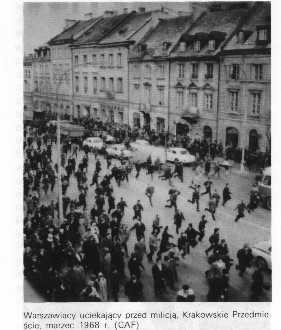
[from: Pawel Machcewicz, Wladyslaw Gomulka, Warsaw,1995].
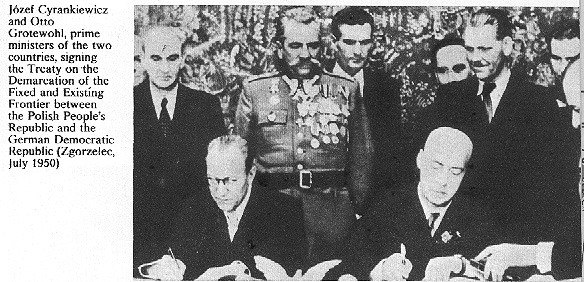
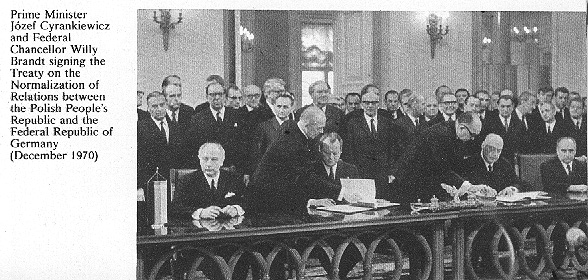
He decided to close down some shipping and aircraft enterprises to save money,
though this worried Moscow. However, what triggered the revolt was the government's
decision to eliminate subsidies keeping food and other basic product prices
low, because they ate up about one third of the state budget. This led to the
decision to raise prices.
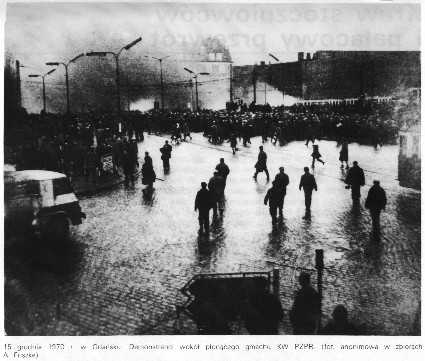
This was the result of Gomulka's decision that there was
a "counter-revolution" in Gdansk which had to be put down by force.
Troops were sent in. They were told that they were going to defend Gdansk against
a German invasion (!). The ZOMO (motorized police) also took part in crushing the workers.
The Interfactory Strike Committee was to reappear as a workers' organization
in Gdansk in August 1980, along with electrician Lech Walesa (pron. Lekh Valensah,
b. 1943), who was a strike leader at the Lenin Shipyard in December 1970.
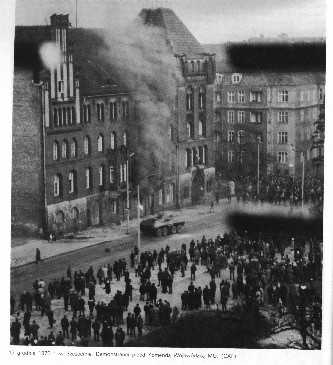
Two members of the Polish Politburo traveled to Katowice to offer
the party leadership to Edward Gierek, (1913-2001), the party boss there. He appeared
on Polish T.V. on December 19, regretting the bloodshed and appealing for calm.
Gomulka resigned for "health reasons" (he did have a heart problem),
and calm was restored.
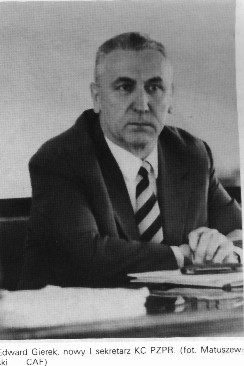
However, an economic decline began in the early 1970s. This was partly due to the rise
of oil prices in the West, which led to economic recession and thus a reduction
in orders for Polish-made goods. But it was also due to continued mismanagement
and waste in the state-run economy.
Protests broke out all over the country, especially in the city of Radom
and the tractor factory "Ursus," just outside of Warsaw, but they were
brutally put down. However, this time the workers and the intelligentsia
came together and a new dissident movement was born.
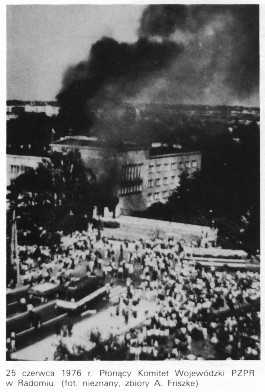
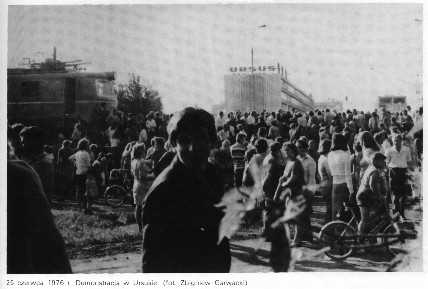
At this time, Wyszynski also proposed the establishment of free
trade unions, an independent judiciary and civil service, and free elections
to parliament Furthermore, he spoke for the economic rights of private farmers,
demanded respect for the indispensable civil rights of all Poles, and said the
Constitution should not contain anything that could limit the sovereignty of
the Polish state. No wonder that Wyszynski was seen as the spokesman
of the Polish nation.* Thus, the role of the Catholic Church was very important
in paving the way for the development of a strong dissident movement in Poland.
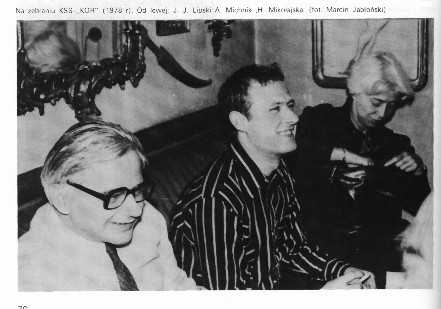
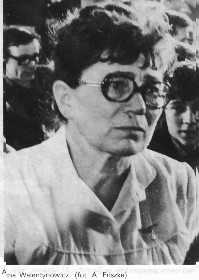
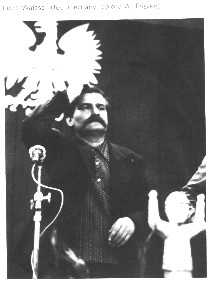
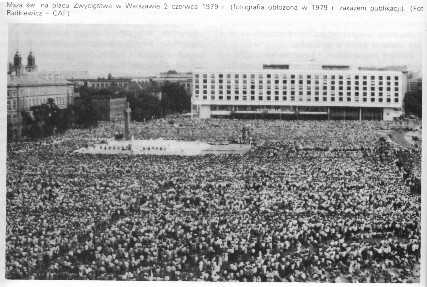
The best processed food - especially the always popular ham - went for export.
One third of the perishable foodstuffs was routinely spoiled for lack
of refrigerated railway cars, trucks and storage facilities. (The same was true
in the USSR).
Much of the expensive machinery imported from the West stood idle and rusted
while the construction of factories, where it was to be used, was delayed or
abandoned due to sudden changes in investment priorities, sometimes at the whim
of those in power.
[Jaroszewicz and his wife were brutally murdered in their Warsaw villa
in September 1992. The murders were professional; robbery seems to have been
the motive, but the case remains unsolved.]
The Lublin strikes were settled by Deputy Premier Mieczyslaw Jagielski (pron. Myechislav Yagyelskee), but their coordination and the strikers’ demands
turned out to be a dress rehearsal for the strikes in Gdansk and other coastal
cities.
This strike might have fizzled out because the shipyard manager -- who had Anna W.
brought back to the shipyard in his limo-- agreed to the establishment a local
trade union, and promised to transmit the pay demands to Warsaw. Therefore,
the workers decided to go back to work.
KOR’s first historian, Jan Jozef Lipski, wrote that while KOR did not
organize the strikes of August 1980, it played an important role in these events
because:
(1) it had prepared workers’ consciousness for these strikes, mainly through
its paper Robotnik (The Worker), and
(2) it distributed information about the strikes once they began. This was done
by telephone where possible, and by courier if not. Indeed, KOR not only
spread information around Poland, but also gave it to foreign correspondents.
To this we should add a third factor: the role of KOR members as advisers to
Solidarity in its negotiations with the government. *
(b) demanding self-management, that is, Workers’ Councils to run state enterprises;
(c) a sliding pay scale to guard against price hikes without increasing wages;
(d) the state was to consult Solidarity and society in general on: economic policy,
restricting exports, improving food supplies, abolishing foreign currency shops
[where people with foreign currency could buy goods unavailable in other shops];
(e) improving work conditions, health services, medication supplies, free Saturdays,
and vacations, also increasing the amount of housing available;
(f) defining censorship;
(g) safeguarding Solidarity and Church access to the media;
(h) the release of all political prisoners and the reinstatement of workers fired after
strikes, and university students expelled for their opinions.
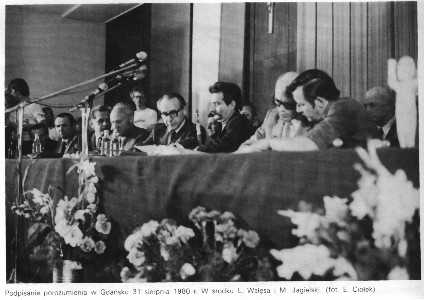
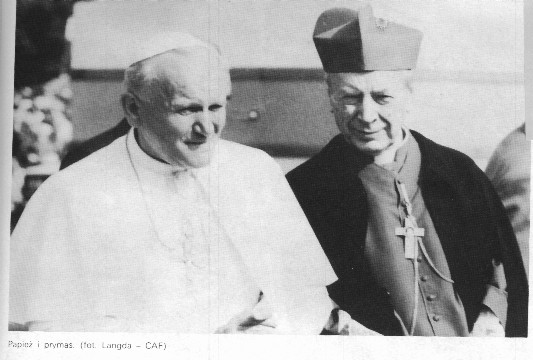
Still the party disintegrated; out of a total of 3,000,000 members, a third joined Solidarity. The
remainder was split between those supporting the status quo and those demanding
the party’s "democratization." The latter held their own party congress
in Torun in April 1981. Their leader and key organizer was Zbigniew
Iwanow (pron. Zbeegnyev Eevanov). He later emigrated to the United States
and died of a heart attack in Texas in 1987).
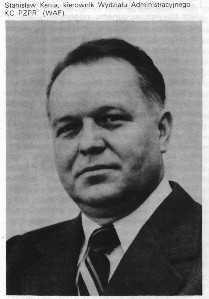
Tension grew and a general strike was barely averted in March, after
police beat up Solidarity delegates in Bydgoszcz. It was averted by an agreement reached in negotiations
between Walesa and Deputy Premier Mieczyslaw F.Rakowski,[Myechyslav Rakofskee].
Nevertheless, in March 1981,Warsaw Pact maneuvers took place in Poland, during which
airports were temporarily closed to civilian planes, and rumors flew in the
West that a military intervention was taking place in Poland. [The author of these notes remembers being at a conference in Washington, D.C., at this time, when reporters asked her and other participants whether they thought there would be a Warsaw Pact invasion of Poland. General Rudnicki and I told them we didn't think so because the Soviets were fighting a war in Afghanistan, where Soviet troops had come in to support a communist government in December 1979.]
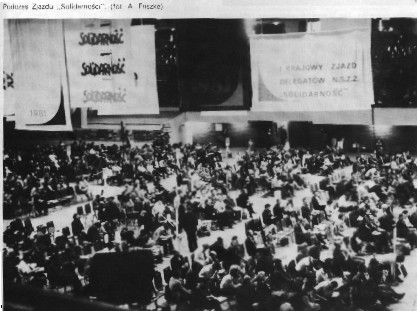
The Congress worked out an impressive document: The Solidarity Program,
which was formally adopted in October. It was based on the program outline published
in April, and attempted to combine democratic reforms with continued party leadership
and loyalty to Poland's obligations as a member of the Warsaw Pact.
Many of the points made in the program of 1981 were to be echoed in 1989, while some of the economic
reforms proposed were gingerly tried out by the government in the period 1985-89.
The program is worth citing extensively both as a reflection of the thinking of Solidarity leaders and their intellectual supporters at the time, as well as to compare it with what happened after the collapse
of communism in 1989.
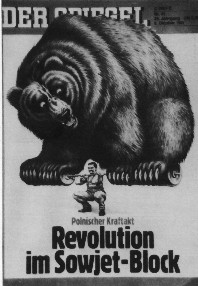
The Soviet mixture of warnings, threats, and support of "healthy elements" within
the Polish leadership was strikingly reminiscent of Moscow’s intimidation of
Dubcek in 1968. For example, on June 5, 1981, a few days before the meeting
of the Polish Central Committee, the Soviet Central Committee sent a letter
to members of the Polish Committee - without addressing the leaders - in which
it spoke of the threat to the revolutionary achievements of the Polish people. Not only that, but Kania and Jaruzelski were accused of a dual
policy of agreeing with Soviet evaluations of the situation, while at the same
time continuing a policy of concessions to "counter-revolution," which was supported
by "imperialist forces." The letter also spoke ominously of Soviet aid to "fraternal,
socialist Poland."

(2) the government would give up the so-called provisional economic regulations;
(3) Solidarity would be guaranteed access to radio and TV.
Brezhnev echoed marshal Ustinov , who had told the chief of the
Polish General Staff, General Florian Siwicki [pron. Seeveetskee]
at the meeting of Warsaw Pact Defense Ministers, Moscow, December 1-4, "This
is not just your affair."
(These statements were clearly reminiscent of Czechoslovakia, 1968).
Jaruzelski said he still saw some chance of a peaceful resolution and
asked to see Nikolai K Baibakov (Deputy Chairman of the Council of Ministers,
Chief of Soviet Economic Planning). Brezhnev agreed to send him to Warsaw..*
Yuri V.Andropov (1914-1984. Chairman of the KGB, (and de facto ruler of
the USSR since Brezhnev was no longer able to act as head of the party), said the Soviet leadership did not intend
to send armies into Poland, but he also said that if Solidarity came to power
and if the capitalist countries should take action against the USSR, that would
be a very difficult situation for the Soviets. He said Jaruzelski had hinted
at Soviet aid.
Marshal Ustinov denied that Kulikov had promised any
Soviet military help to Jaruzelski." Anyhow," said Ustinov, "Kulikov knew very
well that the Poles had asked that armies not be sent into Poland." [this
agrees with the Jaruzelski version] Furthermore, Ustinov said: "the Poles themselves
are stating clearly that they are opposed to the entry of armies. If the armies
go in, this will mean a catastrophe."
The State Council (Cabinet) was summoned at midnight Dec. 12 and met at 1 a.m. to approve
a whole series of decrees connected with imposing a state of emergency/martial
law. All of the Council members agreed except for Ryszard Reiff, long-time party member and chairman of the Pax publishing house.
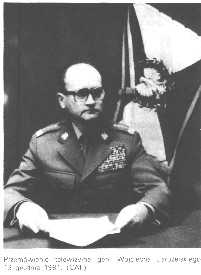
However, the miners of the "Wujek" (pron.Vooyek) mine in Katowice [pron. Kahtohvitse, Upper Silesia] clashed with
armed riot police (ZOMO), resulting in the death of 9 miners and the wounding
of some riot police.The rest of the miners went down into the mine, expecting a general
strike. They were finally persuaded by their parish priest to come out just
before Christmas.
.
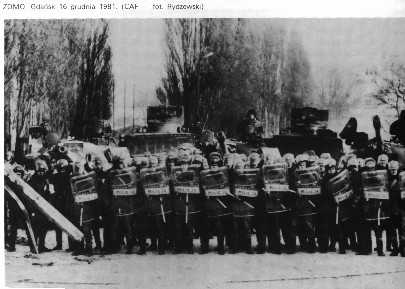
Riot Police, Gdansk, 16 December, 1981. [from Ryszard Friszke, Polska Gierka,
Warsaw, 1995]
Another piece of evidence allegedly proving that Jaruzelski planned to use Soviet
or Warsaw Pact help, was a secret evaluation on the state of the country dated
November 25, in which the concluding sentence read: "The assistance of Warsaw
Pact forces is not ruled out."**
These documents, following on the Soviet Politburo Protocols of December 10
1981, indicating that the Soviet leadership did not want military intervention in
Poland, *** seemed to seal the case against Jaruzelski..
** see piece under this title by Pawel Machcewicz, ibid., pp.40-42]
*** See Mark Kramer: "Poland 1980-81. Soviet Policy during the Polish Crisis,"
CWIHP BULLETIN issue 5, spring 1995].
First, he pointed out that the Soviet leaders of December 1981 were not likely
to have left Poland to her own devices.
Secondly, he emphasized the fact that not only had Anoshkin’s Notebook
suddenly surfaced after 18 years of oblivion, but also that it did not mention
all the conversations he had with Soviet officials in the time period covered,
December 7-17, 1981.
Third, he denied the notebook’s allegations that he had talked by phone
with Yurii V. Andropov, and Konstantin V.Rusakov.
Fourth, regarding the assessment of the national situation of November 25, he said it was
a draft and that a later document on the same topic of December 5, made no mention
of any kind of "aid."
Jaruzelski also cited his telephone conversation on the morning of December
12, 1981, with Mikhail A. Suslov, (1902-1982,CPSU Secretary responsible
for ideology). According to Jaruzelski’s statement -- made to the Polish newspaper, Gazeta Wyborcza, and published 12 December 1992:
Nor can we exclude the possibility that former Russian military leaders still
living, such as those who took part in the Jachranka conference of November 1997, as well
as later Russian leaders, may wish to keep secret certain talks, protocols
and decisions of 1980-1981, because these might either discredit certain Russians,
or/and tarnish the favorable image of the former USSR. This image is dear to many
Russians today, but especially to members of the former Soviet elite and their families.
Finally, Jaruzelski clearly demonstrated his desire to avoid bloodshed
both in repeatedly fending off Soviet pressure to crush Solidarity by force
and, when he finally decided to impose martial law, using methods to prevent a coordinated, bloody resistance, that is, cutting all communications
in the country except for the military. (This was in the plan approved in February 1981.)
In view of the above, a request by him for Soviet or Warsaw Pact military assistance
that would make a bloodbath inevitable, does not make sense unless he suffered some kind of nervous breakdown. Indeed, General Sawicki, chief of the Polish General Staff, claims that Jaruzelski went to pieces around the time the decision was taken -- but Jaruzelski claims that he was on the edge of doing so. The other possibility is that a part of the Anoshkin notebook may have been doctored to make it look like Jaruzelski asked for a guarantee of Soviet aid if things went wrong. This is what Jaruzelski suggests in his published work on the subject..*
Solidarity wanted to democratize the existing communist system by instituting
self-government at all levels of economic and public life. In this, it expressed
the desires of the vast majority of Poles who wanted to run their own lives.
It was a national movement because it was supported by the vast majority of
Poles.
It was a Catholic movement because 98% of the Polish population was Catholic.
Indeed, Catholicism was part of the national identity, and the Catholic Church
had taken the lead in demanding respect for human and civil rights in the 1970s.
Later, it supported dissident movements that prepared the way
for Solidarity.
`